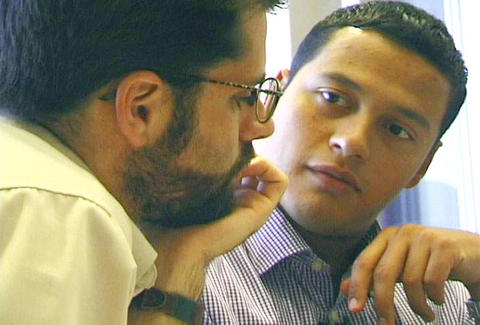Chinese Next, or CNEXT, is a non-profit organization established last year to realize a project envisioned by the founder of sina.com, Ben Tsiang (蔣顯斌), and Taiwanese directors Hsu Hsiao-ming (徐小明) and Chen Kun-hou (陳坤厚).
The aim: to systematically record the evolution of the fast-changing Chinese-speaking societies through visual, audio and written documentation as cultural memoirs for future generations. The project's first fruits are 10 documentary films and other works of art produced in collaboration with CNEXT.
The first year of the grand scheme has seen the completion of eight documentaries from Taiwan, Hong Kong and China that describe the role of money in Chinese-speaking societies around the world. Tonight at Eslite Bookstore, Dunnan Branch, the first CNEXT Theme Documentary Film Festival will begin screening these films.

PHOTO: COURTESY OF CNEXT
An entry at the Venice Film Festival's Orizzonti competition section this year, Umbrella … (傘…) is a sober observational documentary on the lives of workers, peasants, soldiers, students and merchants under the shadow of China's economic miracle. With no narration or dialogue, the film uses images to portray the undeprivileged who become invisible as society as a whole gets richer.
Duckweed (浮萍), on the other hand, features a Chinese entrepreneur named Wu Yu (吳宇). Like many of the newly rich in Shenzhen, Wu quickly amassed a fortune through smuggling and unregulated stock and property transactions. Eager to seek approval as a scholar, rather than as a profit-driven businessman, Wu invests in films and opens the city's first "clean" KTV - no hostesses or sex workers. Both ventures fail to give Wu the credibility he so anxiously seeks.
In a drunken stupor, Wu turns to the camera and says to the director: "Now I'm rich, I have no roots. I float in Shenzhen, just like duckweed."
My Last Secret follows the life of a grandmother in her nineties living with her carer, in her sixties, in Suzhou. In her will, the grandmother bequeaths all her money to a local university, a fact she keeps secret from her family.
The film festival gives local audiences a rare chance to see groundbreaking filmmaking in China. "There are only a handful of independent filmmakers in China making documentaries and even those directors hesitate to criticize the Chinese government," festival director Wu Fan (吳凡) said.
More than a dozen award-winning documentaries from Germany, Netherlands, Australia, India, Norway South Korea, Sweden and the US will be screened along with the CNEX films.

April 28 to May 4 During the Japanese colonial era, a city’s “first” high school typically served Japanese students, while Taiwanese attended the “second” high school. Only in Taichung was this reversed. That’s because when Taichung First High School opened its doors on May 1, 1915 to serve Taiwanese students who were previously barred from secondary education, it was the only high school in town. Former principal Hideo Azukisawa threatened to quit when the government in 1922 attempted to transfer the “first” designation to a new local high school for Japanese students, leading to this unusual situation. Prior to the Taichung First

The Ministry of Education last month proposed a nationwide ban on mobile devices in schools, aiming to curb concerns over student phone addiction. Under the revised regulation, which will take effect in August, teachers and schools will be required to collect mobile devices — including phones, laptops and wearables devices — for safekeeping during school hours, unless they are being used for educational purposes. For Chang Fong-ching (張鳳琴), the ban will have a positive impact. “It’s a good move,” says the professor in the department of

On April 17, Chinese Nationalist Party (KMT) Chairman Eric Chu (朱立倫) launched a bold campaign to revive and revitalize the KMT base by calling for an impromptu rally at the Taipei prosecutor’s offices to protest recent arrests of KMT recall campaigners over allegations of forgery and fraud involving signatures of dead voters. The protest had no time to apply for permits and was illegal, but that played into the sense of opposition grievance at alleged weaponization of the judiciary by the Democratic Progressive Party (DPP) to “annihilate” the opposition parties. Blamed for faltering recall campaigns and faced with a KMT chair

When the South Vietnamese capital of Saigon fell to the North Vietnamese forces 50 years ago this week, it prompted a mass exodus of some 2 million people — hundreds of thousands fleeing perilously on small boats across open water to escape the communist regime. Many ultimately settled in Southern California’s Orange County in an area now known as “Little Saigon,” not far from Marine Corps Base Camp Pendleton, where the first refugees were airlifted upon reaching the US. The diaspora now also has significant populations in Virginia, Texas and Washington state, as well as in countries including France and Australia.